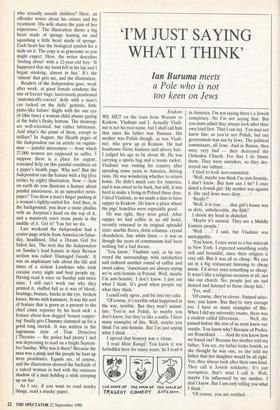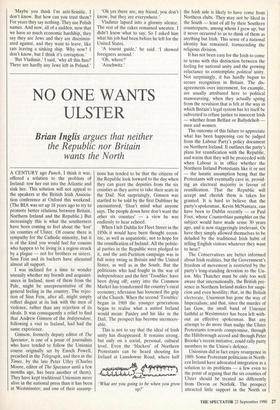'I'M JUST SAYING WHAT I THINK'
Ian Buruma meets
a Pole who is not too keen on Jews
Krakow WE MET on the train from Warsaw to Krakow, Vladimir and I. Actually Vladi- mir is not his real name, but I shall call him that since his father was Russian. His mother was Polish though, as was Vladi- mir, who grew up in Krakow. He had handsome Slavic features and silvery hair. I judged his age to be about 40. He was carrying a sports bag and a tennis racket. Vladimir was visiting his country after spending some years in America, driving taxis. He was wondering whether to return home. He didn't much care for America, and it was sweet to be back, but still, it was hard to make a living in Poland these days. I liked Vladimir, so we made a date to have supper in Krakow. He knew a place where the pigs' knuckles were especially good.
He was right, they were good. After supper we had coffee in an old hotel, recently returned to its original splendid state: marble floors, doric columns, crystal chandeliers, fine white linen — it was as though the years of communism had been nothing but a bad dream.
'You know,' Vladimir said, as he sur- veyed the surroundings with satisfaction and ordered another round of coffee and sweet cakes, 'Americans are always saying we're anti-Semitic in Poland. Well, maybe I'm anti-Semitic. I don't know. I just say what I think. It's good when people say what they think.'
I could only agree, and bit into my cake.
'Of course, it's terrible what happened in the war, terrible. But they won't assimi- late. You're not Polish, so maybe you don't know, but they're like a mafia. I have many examples of this. Well, maybe you think I'm anti-Semitic. But I'm just saying what I think . . .
I agreed that honesty was a virtue.
'I read Mein Kampf. You know it was forbidden here for many years. So I read it in America. I'm not saying there's a Jewish conspiracy. No I'm not saying that. But you must admit they always look after their own kind first. That I can say. You may not know this, as you're not Polish, but our government was run by Jews. The political commissars, all Jews. And in Russia, they were very bad — they destroyed the Orthodox Church. For that I do blame them. They were outsiders, so they des- troyed our culture . .
I tried to look non-committal.
'Well, maybe you think I'm anti-Semitic, I don't know. But how can I be? I once dated a Jewish girl. My mother was against it. She said Jews were dirty. . .
'Really?'
'Well, it is true. . . that girl's house was so dirty, unbelievable, the filth!'
I shook my head in disbelief.
'Maybe it's natural. They are a Middle Eastern people.'
'Well . . I said, but Vladimir was unstoppable.
'You know, I once went to a bar mitzvah in New York. I expected something really rich and beautiful, since their religion is very old. But it was all so cheap. We just sat in a big restaurant listening to cheap music. I'd never seen something so cheap. It wasn't like a religious occasion at all, not like our church. No, people just ate and danced and listened to those cheap hits.'
'Yes, well . .
'Of course, they're clever. Natural selec- tion, you know. But they're very corrupt too. I have so many examples of this. When I did my university exams, there was a student called Silverstein. . . . Well, she passed before the rest of us even knew our results. You know why? Because of Profes- sor Rosenkind. . . . And do you know how we found out? Because her mother told my father. You see, my father looks Jewish, so she thought he was one, so she told my father that her daughter would be all right. Yes, they always look after their own kind. They call it Jewish solidarity. It's just corruption, that's what I call it. Well, maybe I'm influenced by my mother. I don't know. But I am onty telling you what I think.'
'Of course, you are entitled . .
'Maybe you think I'm anti-Semitic, I don't know. But how can you trust them? For years they say nothing. They use Polish names. And now, all of a sudden, now that we have so much economic hardship, they say they are Jews and they are discrimin- ated against, and they want to leave, like rats leaving a sinking ship. Why now? I don't know, but I think it's corruption.'
'But Vladimir,' I said, 'why all this fuss? There are hardly any Jews left in Poland.' 'Oh yes there are, my friend, you don't know, but they are everywhere.'
Vladimir lapsed into a gloomy silence. The rest of the cakes remained uneaten. I didn't know what to say. So I asked him what his job had been before he left for the United States.
'A tourist guide,' he said. 'I showed foreigners around.'
'Oh, where?'
'Auschwitz.'



































































 Previous page
Previous page